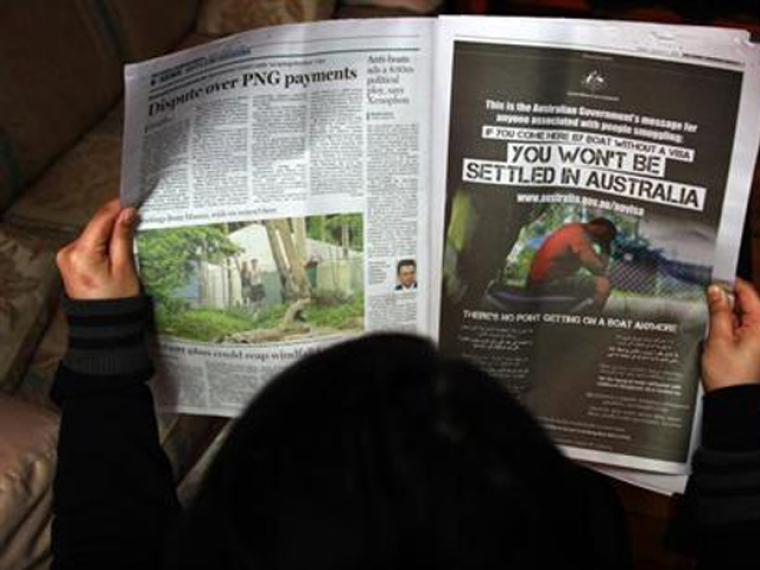Asylum seekers to be accommodated by Australian state leaders
The head of Western Australia state would accommodate asylum seekers following Australia's decision to close off government-funded detention centers where 1,350 refugees reportedly live in dire conditions.

Western Australian Premier Colin Barnett, a member of Prime Minister Malcolm Turnbull's Liberal Party, took a stand against his conservative party's position on the government's widely criticized detention policy.
"We would certainly accommodate a number of them in Western Australia and we'd certainly support them as a state government," Barnett reportedly told the Australian Broadcasting Corp on Wednesday night.
A spokeswoman for New Zealand Prime Minister John Key followed this up by reiterating their previous offer to accept 150 refugees.
Australia's zero-tolerance policy towards asylum seekers aims to discourage migrants by intercepting their voyage and sending them off to the detention camps of Nauru and Manus in Papua New Guinea, never to be held eligible for resettlement in Australia.
Both countries announced Wednesday their decision to close the center on Manus Island, holding 960 asylum seekers after Papua New Guinea's Supreme Court declared the offshore detention center as illegal. However, they did not indicate when the center would be closed and what would happen to the refugees.
"It's never been about tearing down the fences, it's about what to do with the people trapped behind them," Daniel Webb, Human Rights Law Center's director of legal advocacy, told Reuters. "There's absolute clarity about what should happen but no clarity whatsoever about what will happen."
Human rights advocates charged Australia of gross human rights violations through its handling of detention centers, where refugees suffer from physical and sexual assaults. They also lacked basic necessities such as toilet paper and running water and consequently contracted diseases of malaria and typhoid.
"Everybody is tired, people think this news will make us happy but everyone is same like before," said Benham Satah, a Kurdish Iranian refugee in the Manus Island. "I want to believe there is something good happening but I can't. I just focus on seeing tomorrow."
 Christians don't have to affirm transgenderism, but they can’t express that view at work: tribunal
Christians don't have to affirm transgenderism, but they can’t express that view at work: tribunal Archaeology discovery: Medieval Christian prayer beads found on Holy Island
Archaeology discovery: Medieval Christian prayer beads found on Holy Island Presbyterian Church in America votes to leave National Association of Evangelicals
Presbyterian Church in America votes to leave National Association of Evangelicals Over 50 killed in 'vile and satanic' attack at Nigerian church on Pentecost Sunday
Over 50 killed in 'vile and satanic' attack at Nigerian church on Pentecost Sunday Ukrainian Orthodox Church severs ties with Moscow over Patriarch Kirill's support for Putin's war
Ukrainian Orthodox Church severs ties with Moscow over Patriarch Kirill's support for Putin's war Islamic State kills 20 Nigerian Christians as revenge for US airstrike
Islamic State kills 20 Nigerian Christians as revenge for US airstrike Man who served 33 years in prison for murder leads inmates to Christ
Man who served 33 years in prison for murder leads inmates to Christ


 Nigerian student beaten to death, body burned over ‘blasphemous’ WhatsApp message
Nigerian student beaten to death, body burned over ‘blasphemous’ WhatsApp message 'A new low': World reacts after Hong Kong arrests 90-year-old Cardinal Joseph Zen
'A new low': World reacts after Hong Kong arrests 90-year-old Cardinal Joseph Zen Iran sentences Christian man to 10 years in prison for hosting house church worship gathering
Iran sentences Christian man to 10 years in prison for hosting house church worship gathering French Guyana: Pastor shot dead, church set on fire after meeting delegation of Evangelicals
French Guyana: Pastor shot dead, church set on fire after meeting delegation of Evangelicals ‘Talking Jesus’ report finds only 6% of UK adults identify as practicing Christians
‘Talking Jesus’ report finds only 6% of UK adults identify as practicing Christians Mission Eurasia ministry center blown up in Ukraine, hundreds of Bibles destroyed: 'God will provide'
Mission Eurasia ministry center blown up in Ukraine, hundreds of Bibles destroyed: 'God will provide' Church holds service for first time after ISIS desecrated it 8 years ago
Church holds service for first time after ISIS desecrated it 8 years ago Burger King apologizes for 'offensive campaign' using Jesus' words at the Last Supper
Burger King apologizes for 'offensive campaign' using Jesus' words at the Last Supper Uganda: Muslims abduct teacher, burn him inside mosque for praying in Christ’s name
Uganda: Muslims abduct teacher, burn him inside mosque for praying in Christ’s name